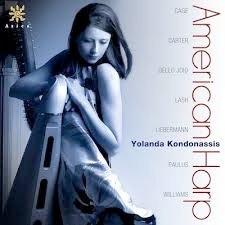by Mike Telin

In her liner notes, Kondonassis writes, “The compositions on this album were chosen to highlight the range and dimension of the harp’s voice in American music from the middle 20th-century to present.” Indeed, the album showcases pretty much everything the harp is capable of doing — and that’s much more than merely glissandos.
The album visits eight works by such well-known composers as John Williams, Lowell Liebermann, Stephen Paulus, John Dello Joio, John Cage and Elliott Carter, as well as a ninth by the young composer/harpist Hannah Lash.
Three of the pieces are world premiere recordings. Lash’s six-minute Stark from 2008 opens strikingly with a colorful use of harmonies and melodic twists and turns — an evocative journey through the emotions of a “beautiful” nightmare. Lieberman’s Music for Harp, op. 116, the longest piece on the album at nearly eighteen minutes, was written for the 2012 American Harp Society Conference. Described by its composer as an abstract work without a program, the Lieberman makes a strong impression with its octatonic and synthetic scales and its beautiful use of harmonics. Paulus’s Berceuse from 1983, is an extract from his longer Divertimento for Harp and Chamber Orchestra. Atmospheric and soothing, it earns its title as a lullaby.
Asian influences are obvious in John Cage’s Landscape, written in 1948. Its creative use of repetition makes the listener feel enclosed in a serene, walled garden without the possibility or desire to escape.
Dello Joio’s Bagatelles, composed for a harp competition, belie their title (“Little nothings”). There’s a lot going on inside these three, short movements, each of which begin modestly and build to a big climax. The Allegro gioioso (a play on the composer’s name?) is fun and full of dancelike rhythms.
The surprise of the album is Carter’s Bariolage. Remarkably engaging for a piece from the composer’s later years, it’s part of a 1992 Trilogy for oboe and harp written for Ursula and Heinz Holiger. The title refers to a baroque bowing technique that puts notes in close juxtaposition, a feature that becomes more lucid as the piece unfolds.
The album begins with John Williams’s The Lanes of Limerick, a lyrical snippet from the composer’s score to the film, Angela’s Ashes. It’s like having dessert before the meal.
Kondonassis writes that she loves these selections for “the peace and elegance” that the composers have achieved in writing for the harp. Besides demonstrating her technical prowess, the album reveals Kondonassis’s musical character as the epitome of grace and charm. The sound quality is excellent. The clarity of Bruce Egre’s recording (made in Clonick Hall at Oberlin and produced by Kondonassis and Alan Bise) allows even the most subtle nuances of Yolanda Kondonassis’s playing to be appreciated.
Published on ClevelandClassical.com July 17, 2013
Click here for a printable version of this article.



